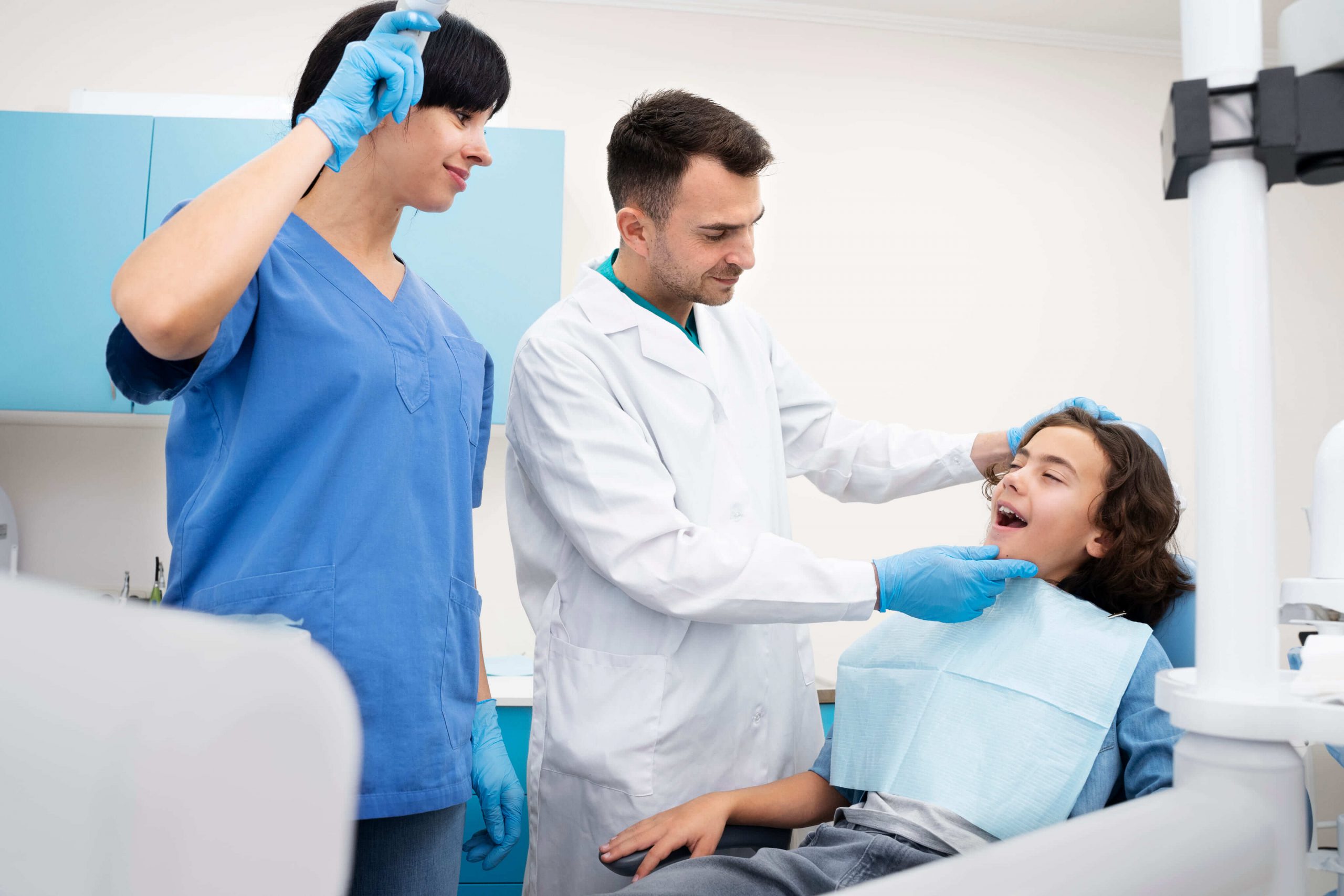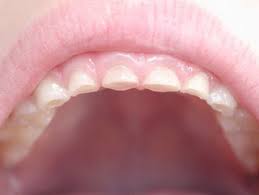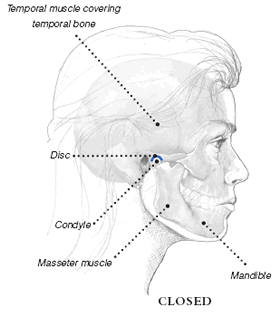
Why do people clench their teeth at night?
During the night, the brain cycles through lighter and deeper stages of sleep. As the brain approaches deep sleep, all the muscles in the body have to fully let go and relax. This can cause trouble for the airway as the tongue and muscles in the throat and airway relax. The jaw is heavy and can easily reverse and block the main airway along with the tongue. The tongue, when fully relaxed can be displaced towards the throat and block the airway also. All these conditions can restrict air flow during breathing during sleep. This is called UARS or upper airway resistance syndrome. During UARS people will clench their teeth as a reflex. It is a defense mechanism to arouse someone from deep sleep to restore normal breathing patterns by opening and clearing the airway.
Orthodontic expanders and breathing exercises is the way to correct airway obstructions. Contact Dr. Adams for a complimentary appliance consultation

kids clenching bruxism
Options for treating TMJ pain and teeth clenching video
Teeth Clenching re-opens the airway during collapse
Researchers studied brain scans of people with airway resistance problems and what they noticed is that it was grinding (also called bruxism) that reopened the airway and got the study participants breathing again. As soon as they were given something to keep their airway open all night long like a CPAP machine or a dental appliance, the grinding stopped and so did the “sleep apnea” events.
Orthodontic Expanders can cure upper airway resistance
The DNA appliance therapy is a novel treatment that cures TMJ, sleep apnea and all the reasons why people grind their teeth at night time. The DNA or another adult orthodontic expander call the Homeoblock appliance is the best way to stop clenching and correct airway collapse?
Teeth clenching can cause a lot of damage
If grinding is what saves us, then what’s wrong with it? While grinding is effective at saving us at night, there are consequences to having interrupted sleep every night. You’re not sleeping well if you grind your teeth. Even with slight sleep apnea, you’re waking up in a damaged state. Tensing up the muscles to grind bounces the body out of deep sleep, and all the health benefits of sleep you read about come from deep sleep. This is where human growth hormone (HGH) is released, reversing the aging process, tightening skin, improving memory, burning fat, and building muscle, and potentially warding off diseases like Alzheimer’s. Untreated sleep apnea can have serious and life-shortening consequences like high blood pressure, heart disease, stroke, automobile accidents, diabetes, depression, anxiety, and weight gain. Don’t fall into the eight hour trap — just because you’re unconscious for eight hours, doesn’t mean it’s quality sleep.
Clenching causes cavities and teeth cracks
Teeth grinding causes people to need more dental work including fillings, dental implants, and crowns. The dental work just repairs wear and tear caused by clenching and not the cause of clenching. Later the dental work fails from more clenching and grinding and needs to be redone. Years of grinding and clenching can damage your teeth, cause tooth decay and tooth sensitivity, and lead to permanent jaw pain and damage to the TMJ.
Can night guards prevent clenching?
A mouth guard often makes things worse. A mouth guard is put in place to protect the teeth from grinding, but since it can reposition the jaw, it can actually make the obstruction of the airway worse.
Teeth clenching is a symptom of sleep apnea
If you grind your teeth, the new standard of care is that you get a sleep study because you are likely having episodes of interrupted breathing during the night and missing out on all the health benefits of deep stage sleep. Even if you’re otherwise healthy, sleep apnea is known to significantly increase your risk of high blood pressure, stroke, cancer, diabetes, depression, and obesity.
A Swedish study estimated that as many as half of women aged 20 to 70 suffer from some degree of sleep apnea which ranged from mild to severe. The old idea of an obese, middle-aged man who snores is no longer what we should think of when it comes to sleep apnea.

tmj1
Who is most at risk of sleep apnea and clenching
- Petite women
- Children with ADHD and other learning disabilities
- People with a long neck
- People who did not breastfeed as infants
- People with anxiety and depression
- Anyone who grinds their teeth at night
Treating airway problems cures bruxism
To treat grinding, you have to treat the source of what’s causing it, and that’s a small airway. If you grind your teeth, you might have been told that you need to sleep with a mouthguard to protect your teeth from wear and tear and that’s based on the old standard of care. Neglecting teeth grinding can lead to excessive wear and tear on teeth, leading to tooth decay, periodontal tissue damage, jaw pain, and headaches. The new understanding is that, in order to treat teeth grinding, you have to treat the root cause that is causing you to grind your teeth. And that’s the obstruction of the airway.
Treating airway obstructions prevents teeth clenching
If you grind your teeth, it should be considered first due to its seriousness that you likely have a small airway and the reason you’re grinding is to open your collapsed airway while you’re sleeping.
In fact, wearing a mouth guard to protect your teeth from grinding may even make you grind more, since a mouth guard repositions the jaw in such a way that the airway could be getting blocked more than it would be without the mouth guard.
Mouth Guard can cause more harm than good
But how do you know if you grind your teeth if you’re asleep when you’re doing it? Most people don’t know that they grind their teeth until their dentist tells them. Unless the clenching is so frequent that TMJ pain commences.
How to Know If You’re Grinding Your Teeth
- Wear on your teeth
- Teeth that are worn flat
- Abfractions or holes in your teeth by the gumline
- Gum tissue loss and “recession”
- Sore jaw muscles
- TMJ pain
- A jaw joint that clicks when opening and closing your mouth
What to Do If You Grind Your Teeth
Talk to your dentist. Your dentist can’t make the diagnosis — she or he will leave that to the sleep medicine MD, but your dentist can screen you for teeth grinding and examine the beginning of your airway as you lie flat in the chair at your next appointment. There is an oral appliance your dentist can make for you that keeps the airway open while you sleep, which can work great in conjunction with a CPAP machine or even by itself in mild cases.
Get a Sleep Study Done
Find out if you grind your teeth. The telltale signs of a grinder are flat, worn teeth, jaw clicking, or jaw pain. Ask your dentist to be sure. Talk to your doctor about getting a sleep study. Ultimately, you will need a sleep study to get a diagnosis for sleep apnea from a sleep specialist.

 (301) 421 1996
(301) 421 1996 burtonsvillesmiles@gmail.com
burtonsvillesmiles@gmail.com